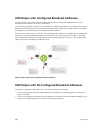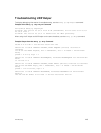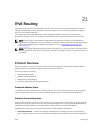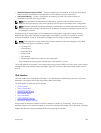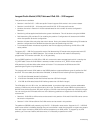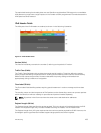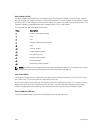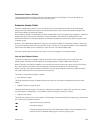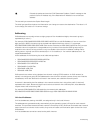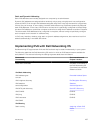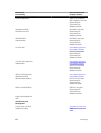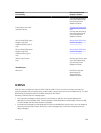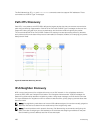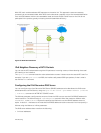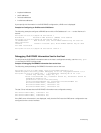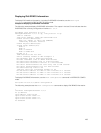11 Discard the packet and send an ICMP Parameter Problem, Code 2 message to the
packet’s Source IP Address only if the Destination IP Address is not a multicast
address.
The second byte contains the Option Data Length.
The third byte specifies whether the information can change en route to the destination. The value is 1 if
it can change; the value is 0 if it cannot change.
Addressing
IPv6 addresses are normally written as eight groups of four hexadecimal digits, where each group is
separated by a colon (:).
For example, 2001:0db8:0000:0000:0000:0000:1428:57ab is a valid IPv6 address. If one or more four-
digit group(s) is 0000, the zeros may be omitted and replaced with two colons(::). For example,
2001:0db8:0000:0000:0000:0000:1428:57ab can be shortened to 2001:0db8::1428:57ab. Only one set
of double colons is supported in a single address. Any number of consecutive 0000 groups may be
reduced to two colons, as long as there is only one double colon used in an address. Leading and/or
trailing zeros in a group can also be omitted (as in ::1 for localhost, 1:: for network addresses and :: for
unspecified addresses).
All the addresses in the following list are all valid and equivalent.
• 2001:0db8:0000:0000:0000:0000:1428:57ab
• 2001:0db8:0000:0000:0000::1428:57ab
• 2001:0db8:0:0:0:0:1428:57ab
• 2001:0db8:0:0::1428:57ab
• 2001:0db8::1428:57ab
• 2001:db8::1428:57ab
IPv6 networks are written using classless inter-domain routing (CIDR) notation. An IPv6 network (or
subnet) is a contiguous group of IPv6 addresses the size of which must be a power of two; the initial bits
of addresses, which are identical for all hosts in the network, are called the network's prefix.
A network is denoted by the first address in the network and the size in bits of the prefix (in decimal),
separated with a slash. Because a single host is seen as a network with a 128-bit prefix, host addresses
may be written with a following /128.
For example, 2001:0db8:1234::/48 stands for the network with addresses
2001:0db8:1234:0000:0000:0000:0000:0000 through 2001:0db8:1234:ffff:ffff:ffff:ffff:ffff.
Link-local Addresses
Link-local addresses, starting with fe80:, are assigned only in the local link area.
The addresses are generated usually automatically by the operating system's IP layer for each network
interface. This provides instant automatic network connectivity for any IPv6 host and means that if several
hosts connect to a common hub or switch, they have an instant communication path via their link-local
IPv6 address.
Link-local addresses cannot be routed to the public Internet.
456
IPv6 Routing



